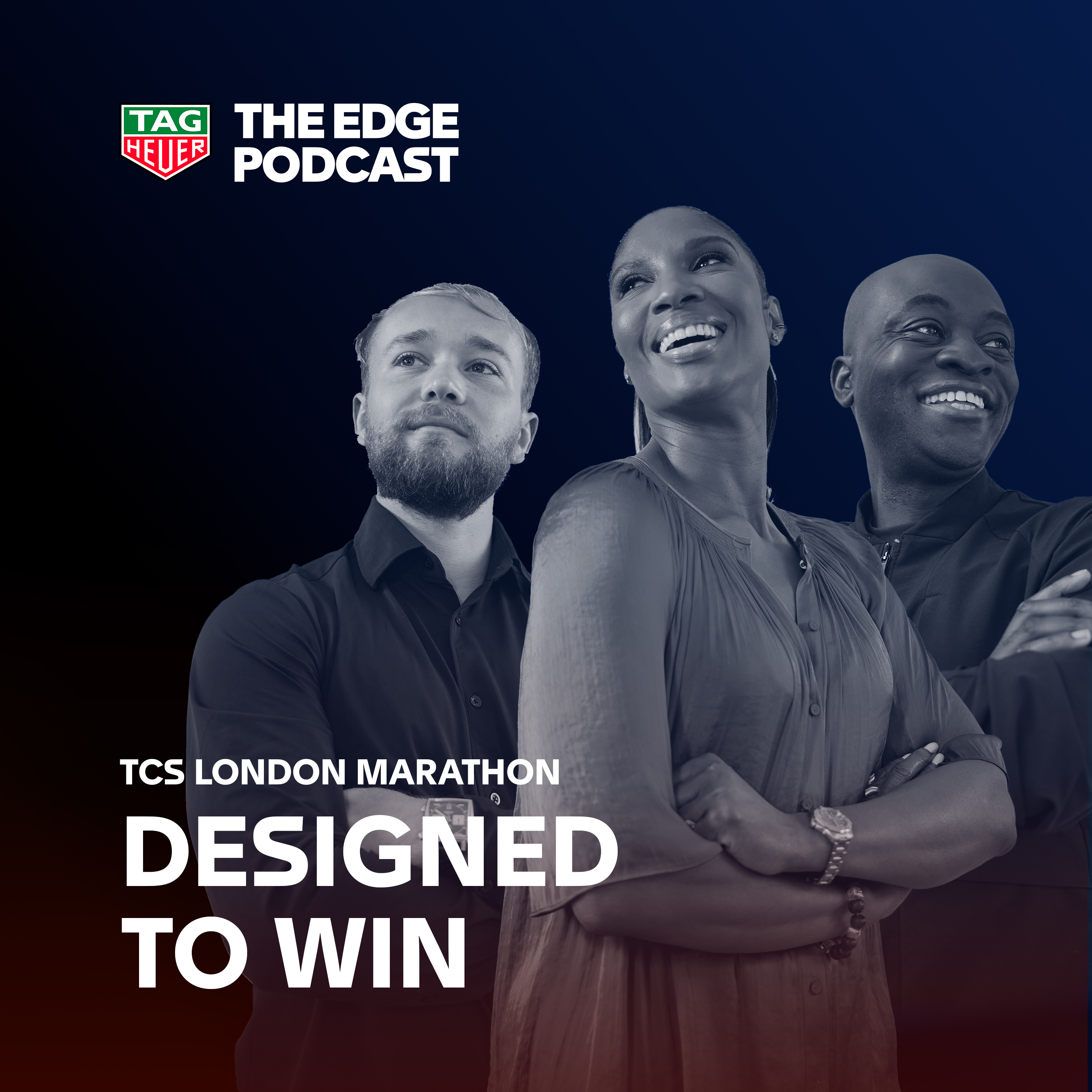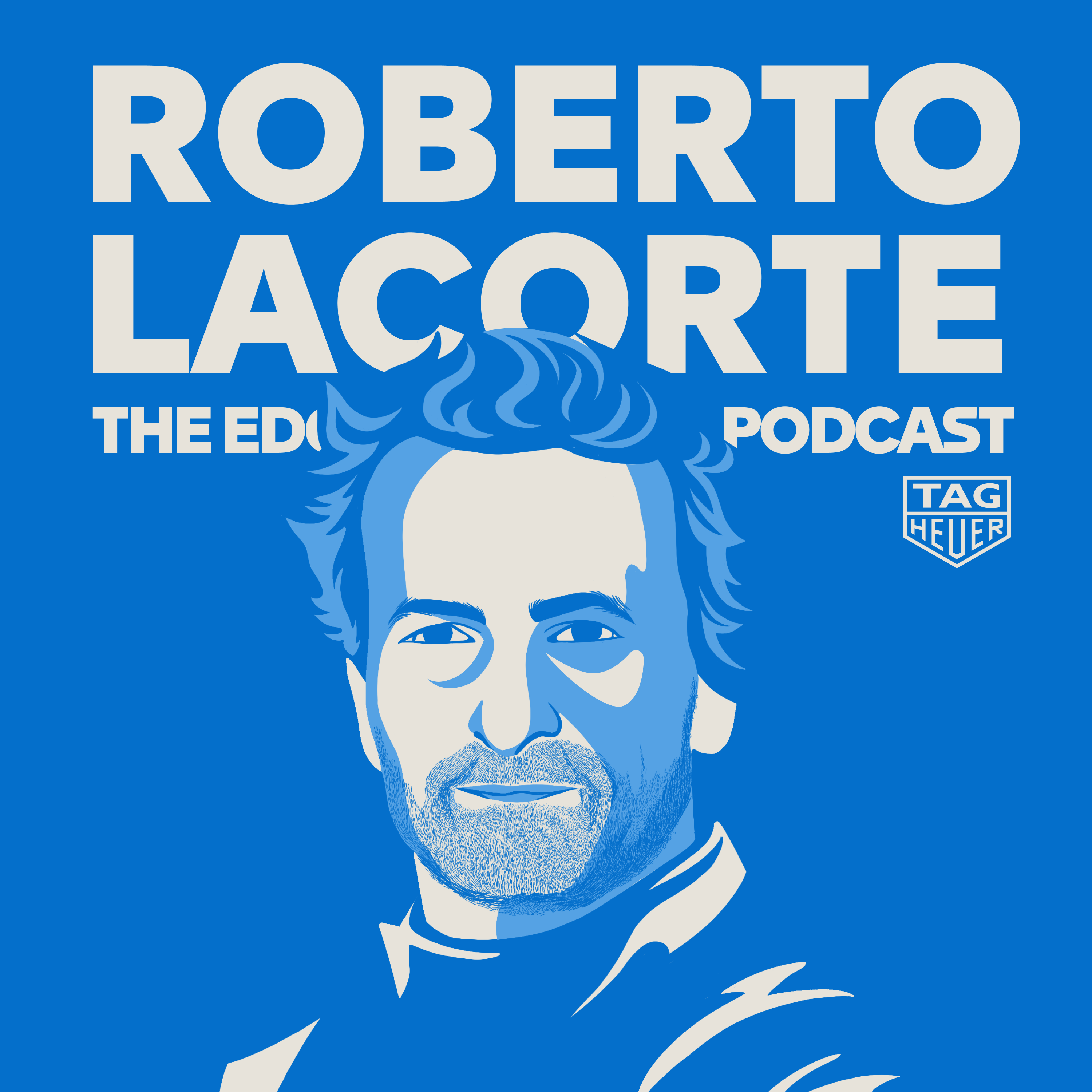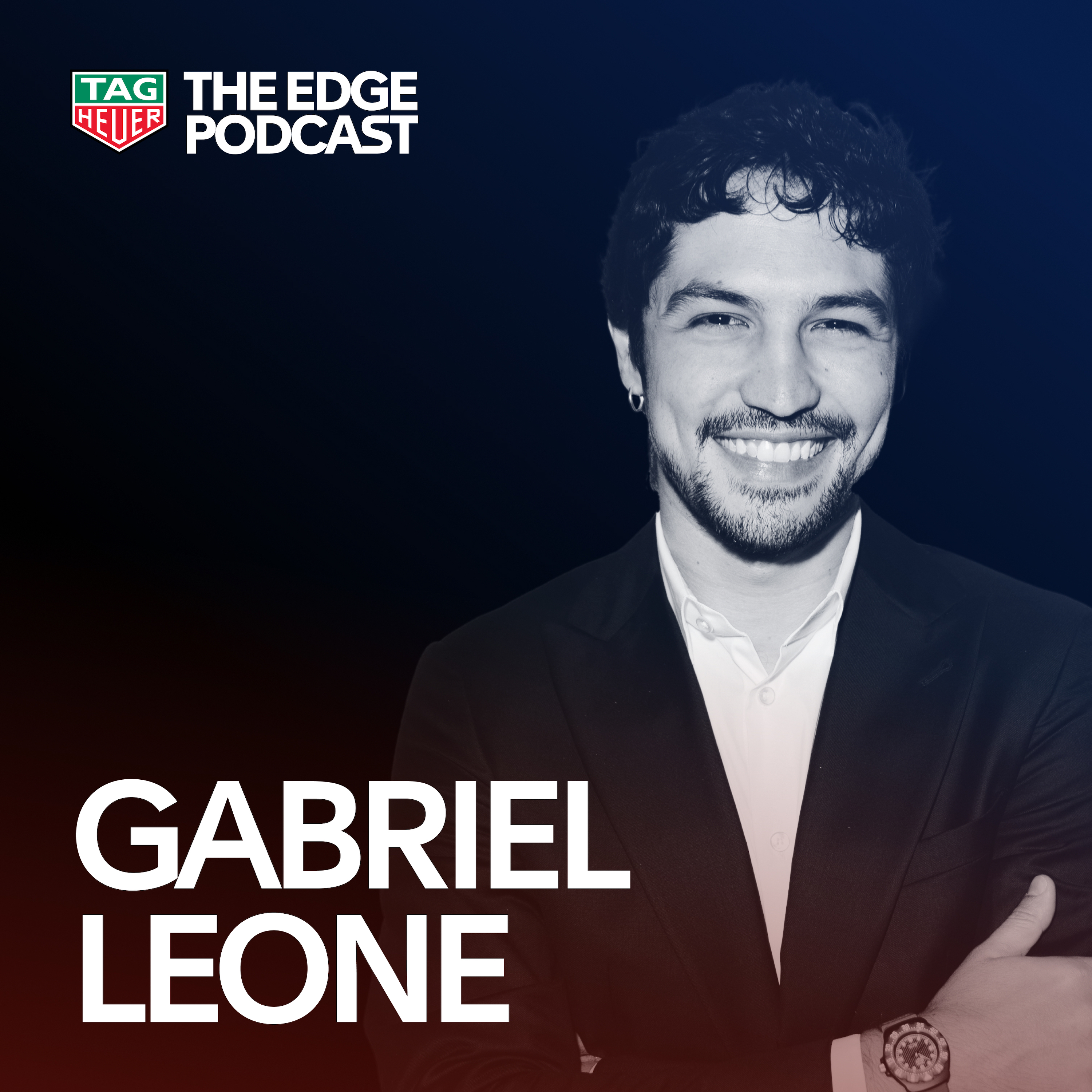Episode Transcript
[00:00:00] Speaker A:“I am not designed to come second or third. I'm designed to win”. Those words belong to Ayrton Senna - a Formula One legend. But more than that, someone whose mindset shaped his legacy. This is the Edge, Designed to Win. It's a TAG Heuer podcast about the mentality that powers greatness. I'm Jeanette Kawkye - MBE, Olympian, author and broadcaster. And in this episode, we explore what it really takes to push beyond limits. The mindset, the decisions, the edge that you carry into every part of your life. And today I'm joined by three extraordinary guests who live that mentality in sport, in community, in adversity and in the everyday. They really are very, very special. So let me introduce you to them.
First up, Charlie Dark. MBE, a poet, a DJ, an educator and the founder of Run Dem Crew, a movement that reshaped running culture across London and beyond. He is an urban legend and turned these city streets into safe spaces. He's created a community where running became about joy, self-expression, mental health. He's been called Mr. London Marathon and he's mentored thousands. And Charlie's mantra? Run hard, stay humble.
Next up is Billy Munger. A former racing driver, dub amputee, triathlete and ironman. After a life changing crash at just 17 years old, Billy faced a decision. You either stop or you rebuild. But he chose to redefine what winning looked like. He returned to motorsport. He took on endurance challenges, walked, cycled and kayaked 140 miles for charity. He's a world record holder, a mental powerhouse (in the nicest possible way) and a symbol of what's possible when resilience meets belief.
And finally, Dame Denise Lewis. An Olympic gold medallist, former heptathlete, author and broadcaster. Her career has been defined by excellence and longevity. From the Commonwealth Games to the Sydney Olympics, she's absolutely mastered the art of discipline and durability. She's also a mother of four, a mentor and a voice shaping the future of sport. Her edge, precision, power and perspective. Perspective together on this, we're going to unpack what designed to win really means. From how you think under pressure to how you show up when no one's watching. I'm very excited to do this. So let's get into it.
Billy, I feel like I have to start with you here. I just feel like what you've been able to do is to jump into a space and a place whereby you've really shown just how different you can be, but in a really good and positive way. And you've had to do that off the back of adversity and move to where you are now and just give us a bit of insight into that journey and how you knew you are a little bit different in a good way.
[00:02:56] Speaker B: Yeah, I think like the accident for me is the thing that, you know, changed my life dramatically. Like there's no getting away from that fact. And I guess when you're going through adversity of that scale at such a young age, there's. You don't know how you're going to react to that sort of adversity until it comes your way. And I think that's, you know, the truth. People like obviously my adversity is obvious. You know, I've got, you know, two amputated legs, this, that and the other. But adversity is everywhere in life. It's just disguised in different ways. I now try and seek adversity and like day to day stuff. I seek challenge in my life because I find when I do that and when I don't avoid challenge, my life actually becomes easier.
[00:03:37] Jeanette Kwakye: Denise, when you hear someone like Billy speak about his experience as a 17 year old and having to change his whole Life, you at 17 were just realising your talent and coming into your own as this incredible Olympic athlete. And did you realise from quite a young age that you were different in terms of how you thought about things?
[00:03:53] Speaker C: I've had this conversation with my mom on numerous occasions and it really does boil down to the fact that I think I had just that, that I'm just a bit different. I always wanted to challenge myself but I think my environment that I grew up in meant that I was, had to be very self reliant from a very young age. And all the accountability that brings makes you kind of like okay, I can keep getting that resistance and that challenge and I'm okay about that. And so I had to be resilient and I had to look after myself. But how you come through it builds the confidence and then the confidence keeps is a repeat process.
[00:04:38] Speaker B: It's always those first steps that are the hardest as well.
[00:04:40] Speaker A: Isn't it what I'm getting here that you guys love pressure?
[00:04:42] Speaker C: There are times in your life when you are practicing the pressure so you're living the pressure. That was my job, to live that pressure and to be, to be able to withstand pressure, you know, so almost unbreakable mentally.
So I rehearsed that. So I lived, breathed it, woke up thinking about it, give me the pressure because I want to be able to be that resilient when I need it most.
[00:05:07] Speaker A: Wow.
[00:05:07] Speaker C: So even becoming injured and getting injured in those sort of nine weeks before the start of my, the medal that I've always wanted and I was that close to getting even being injured before then, wow, you're going to get through it.
[00:05:21] Speaker B: Did you feel fragile when you'd like when you first got that like injury? Because all of a sudden, like you say you're practicing, when you're training, you're practicing dealing with that pressure, but then when that pressure completely shift to being injured and having to deal with that, is that, how different was that?
[00:05:38] Speaker C: That is actually that pivot, isn't it? It's that mindset where you go, okay, I'm no longer thinking about that long term goal and the outcome of that. I'm thinking about what can I do today and can I start building these little bricks to making the self and the mind feel better? And so once that confidence comes back in what you're doing in that moment and being really present in that, to making those moments feel like 100% you get closer to your goal. But I think my greatest asset really was that mental work and understanding the complexities of, of, of what I do. So you know that there's going to be one event that's going to go probably not the way you planned, but you have to see that before it actually happens. You have to have visualized that and know what that feels like. How disappointed am I going to be? How will that impact, what will I do next when I have that moment? Because it will come. As an athlete generally, I didn't spend much time thinking about other athletes during the course of competition. I was really that self aware in my moment. And you know, people knew when the competition was coming up because I would just say less. My senses are amplified, you know, they're really heightened because I'm just, yeah, you're in that zone. And so people would be like, okay, we're not going to talk to her today or do this. I just don't need to talk that much.
[00:07:10] Speaker B: I think when you put pressure on yourself as well, pressure can come in all sorts of different shapes and sizes. But when you put pressure on yourself to deliver and to go and seek these things out, you control it in a way you take control because you've put that ownership on, okay, I've put pressure on myself to go out there and try these new things and deliver. And you don't leave it up to other people to put that pressure on you.
[00:07:33] Speaker A: When you think about your time as an athlete, Denise, you probably had two major Competitions a year as a hept athlete. Right. You know, really big ones where you had to really get yourself going and one of them would have been a championship. So how do you try and then throughout the season maintain that level of a commitment, dedication and focus, but stay mentally present over that period of time as well?
[00:07:55] Speaker C: It's purpose. It's purpose.
A long time ago I realized that in order for me to be seen in the event that I chose to do that really not many people could tell you what the seven events were. In heptathlon, I have to make sure I'm good when it really matters because I need eyeballs on what I do for people to take me seriously. So you had to be more than I had to be, Denise. Plus, when I showed up, did you have a rival? I had loads of rivals.
[00:08:24] Speaker D: Do you have pictures of your rivals up in your house to motivate you?
[00:08:27] Speaker C: No, not at all. Because I have my mind. They're going to do what they do, they're going to bring their game, they're going to bring what they have. I need to be ready to, to compete. I've got to be ready to do battle. I'm going to have to be ready to withstand the low when it comes. Because it will come. Like I said in the seven, it will happen. But how? What's my bounce back ability like?
[00:08:49] Speaker D: Right.
[00:08:49] Speaker C: Is it going to be better than theirs?
[00:08:50] Speaker D: Yeah.
[00:08:51] Speaker C: I'm going to look at your body language and I'm going to say, are you ready, Charlie?
[00:08:55] Speaker A: When you hear Denise talk like that, there's a real edge to that.
[00:08:57] Speaker D: There are certain people you meet and what they teach you, and this is something that you've taught a lot of people, is don't be content with low hanging fruit. And I think that ability to spend time with people who are very, very different from you, who kind of, you know, will take you out of your comfort zone and put you in something new.
[00:09:13] Speaker A: Yeah, but Denise, when you wake up in the morning, there are days you don't even want to get out of bed, let alone think about being an Olympic champion.
[00:09:19] Speaker C: But it's only for a minute. You have got to tell yourself, I know why I'm here. I know what I'm doing. I know that my purpose is this.
[00:09:27] Speaker A: Can I ask then, Denise, when did the tears of frustration come? Did you ever get frustrated? Because as an athlete there'd be days I'd so emotional and so frustrated if I couldn't execute certain things. Did you never get that?
[00:09:40] Speaker C: Of course you do. When you can't quite get it. But you know, that is when you know I'm rolling my sleeves up because I want to get it. I want to understand, paint the picture. And that's why the relationship between coach and athlete in this instance or mentor, mentee is important because you have got to check and challenge. You've got to challenge. I don't get it. Make me get it. And there'll be some days where it's not going well and shoes are in the bag, bags on the back and.
[00:10:12] Speaker A: I'm gone, going home.
[00:10:12] Speaker C: Right. Because there is no point in beating myself. I don't want to wallow in frustration. I want to get over it as quickly as possible.
So I'm gone. But I'll be back tomorrow and I'm going to pick up where I left off because I'm that hungry to make sure I improve.
[00:10:28] Speaker A: Billy, from your perspective, how do you manage progress versus patience?
[00:10:33] Speaker B: Being a racing driver since I was a kid, patience is not my strong suit. I'll be real. It's. Yeah, it's, I've always been that person you want to see progress as quickly as possible. And I think again, like when you go through something like becoming a double amputee. I was very fortunate to speak to someone who had been, basically was a racing driver, became a w amputee, been through exactly the same scenario as me, which is very rare. And he basically said, I know you're going to be impatient, you're going to want to do things at 100 mile an hour, but this takes time. You can't rush this and you have to kind of be content with that. And that for me was a real learning of, okay, it is going to take time. The journey's never straight up. There's those highs where you think you've, you know, you've made real progress and then it knocks you back down and you've got to pick yourself back up again. It's those highs, those lows. And that for me is like, was such a challenging thing to figure out and to deal with. But knowing that, almost knowing that that's part of the package and trying to expect that there to be, you know, those lows that are going to come your way not to get too carried away when things are going good because then when those, you know, those step, those bad things happen and you take those steps back, it really can knock your confidence. So just to kind of expect it and to be patient with it, that's something that I've had to, yeah, really learn over some time.
[00:11:56] Speaker A: Lack of patience isn't the reader term, but would you say that you.
That.
[00:12:00] Speaker C: That you're.
[00:12:01] Speaker A: You wanting to push on and be that person has propelled you a lot faster than what many other people who maybe have a little bit more patience?
[00:12:11] Speaker B: Yeah, I think there's got to be an element when you're doing something and you're chasing, like, a go or a dream that you want to get there as fast as possible. Like, as much as you have to be patient in those moments, like, if you don't have that eagerness and the ambition to get there as fast as possible and to, like, give it your all, then you know you're never going to get there. You're almost putting yourself on the back foot from the start. So for sure, like, that's something that I still battle with and I still have to get that balance right.
[00:12:37] Speaker C: I was listening really intently to that. It's about your work ethic. It's about having those people around you, the right type of people around you that can build your confidence along with your skill, if you have to have the skill. But it's the building the mind as well in parallel that I think has been my greatest fortune. There is something about that inner internal confidence, and why should I have it? Why should you have it? But it's actually, I want more for myself. It's. I want to push the limits, the boundaries, you know, whether it's, I'm going to be better in my town, I want to be better in my county, I want to be better, better in, you know, Britain. It's all about those goals.
[00:13:21] Speaker A: The best in the world, Denise. I mean, guys, actual Olympic champion, gold medalist, legend with that, Denise. And did you. You know, there were habits every day that you had to put in place to make sure that happened. But did you. Did you always believe that you were going to be an Olympic champion? That is crazy.
[00:13:42] Speaker C: I believed I was. I had what it takes. Talk. Sorry. I believed that I had the right ingredients. I really did. You know, I had the work ethic, I had the drive, the environment I created. And when I recognized that the environment wasn't conducive to high performance, I moved. I made sure I, you know, could seek high performance.
And the repetition, it's the repetition of those. Those good behaviors that you indicated. So always looking for the small wins, not taking the lows as absolute lows, not taking the highs as absolute highs. It's just, can I keep progressing?
[00:14:23] Speaker B: Why not you, like, yeah.
[00:14:24] Speaker C: Why not you?
[00:14:25] Speaker B: I think like everyone, sometimes people put themselves at disadvantage or box themselves in with, you know, their mind, if they just think, oh, that's not for me, I can't achieve that. But like, with the stuff that I like, try and do that, that's always something I have in the back of the mind, is that I know everyone is capable of achieving these amazing things. And it is that mind over matter mentality of like, you can see it for yourself and you go out there and do it. You give like power to other people to change maybe their mind and think, oh, well, you know, if they've done it, why, why could I not do that too?
[00:14:58] Speaker C: You have to be curious. Be curious about life, you know, and be curious about what if I dip my toe in that? Well, what's going to happen?
[00:15:07] Speaker A: And Billy, when you set out to do your Iron man, you said you want to break a world record. Like that is language for someone to open their mouth and say to the universe, I want to be the best there has ever been. When you think about winning mentality, that's right up there. When you woke up that morning, what possessed you? Billy, you said, right, I'm going to just be the best ever.
[00:15:28] Speaker B: Yeah. The whole idea for that challenge of combat relief and tempting that world record, it came from my trainer, went away and decided to come up with a few ideas for something that I could potentially do. And there was a list of different challenges, things that I could potentially do. And yeah, that one stood out to me. Cause it was just that competitor within me of like, he put the world record time and a question mark underneath the challenge itself to do the ironman. And that question mark, man, that was the thing that just ended up me committing just over a year to training day in, day out. And it was just that, what if.
[00:16:02] Speaker A: Charlie, anybody that you're introducing to running in your role, yeah, they're coming. Everyone's got a different story. Everyone's going to have their own personal challenge. What do you say to them to be able to try and push them through that first initial step? Because we all know is that literal, that first step that is so, so difficult.
[00:16:18] Speaker D: I get people who kind of like, you know, they go from not running to doing their first marathon, to doing like this event called the Speed Project, where you run from LA to Vegas in the space of a year. And I always say to them, because the running is not the hardest thing that you've ever done. The hardest thing that you've done was the day that you put your shoes on and you went out for the first time and it hurt from the very first Step to the last and you only lasted 10 minutes. And then you achieve it. That's the hardest thing. The road, as I always say, doesn't care whether you're unemployed, multi millionaire. It just asks you, are you ready? If you're ready, it's going to reward you. If it's not, it's going to teach you a very important life lesson. And then harking back to what you were saying. I think what running has taught me is how to be comfortable with the feeling of being uncomfortable. And I think a lot of people are like, as soon as things get hard, they're parachuting out of the plane.
[00:17:10] Speaker A: What do you wish that more people could, if they could tap into your mind, what do you wish more people could see that goes on when you're in your zone and you're pushing and going towards your goals?
[00:17:20] Speaker B: That I still have the same doubts and fears that they do. And that doesn't go away even if you're chasing something great. And people, you know, see you doing this thing that they don't believe is possible for themselves. Like there are plenty of moments where that doubt creeps in, that fear creeps in. But it's just learning to overcome that and to accept that it's going to be there, but then to put it to the side and keep going on the journey, not letting it take you off course. Like I think people see like athletes and high performing people doing that thing and they just think that they don't have that. But everyone has those doubts and fears. Like that's, that's just part of being a human being. Like it would be impossible to not have that.
[00:18:05] Speaker C: You see, it's having the ability and the mindset to control the fear.
[00:18:10] Speaker D: Yeah.
[00:18:11] Speaker B: And being, I think, and just being aware of that other people are going through the same thing that you are. Like it's so easy to think when you have problems that you're the only one that is facing those problems and no one understands what's, what's going on because they're not having the same problems as you. But problems are problems. They come in different shapes and sizes. Everyone's dealing with them and it creates those doubts and fears. But yeah, it's just learning to control them, isn't it?
[00:18:35] Speaker A: This has been absolutely brilliant. I want to get a final thought from each of you. How do you reset yourself when things go completely off course?
[00:18:42] Speaker C: Stop and pause, stop and pause, stop and pause and go.
[00:18:46] Speaker A: Stop, pause, go.
[00:18:47] Speaker C: And then what needs to be done?
[00:18:49] Speaker A: Billy, what's the first thing you say? To yourself when the pressure hits, like it just slaps you in the face.
[00:18:55] Speaker B: This is what you've prepared for. This is what the whole thing was about in the first place, is being prepared to handle this pressure right now.
[00:19:02] Speaker A: And, Charlie, what's your pre challenge ritual?
[00:19:06] Speaker D: The ritual is, I'm enough, I'm loved, I'm strong, and I deserve to be here in this moment.
[00:19:13] Speaker A: So, affirmations.
[00:19:14] Speaker D: Affirmations.
[00:19:14] Speaker A: That is fantastic. You guys have been incredible. Honestly, I have taken so many notes today. So many notes. I want to say a massive thank you to the guests today. Charlie Dark MBE, Billy Munger and Dame Denise Lewis.





